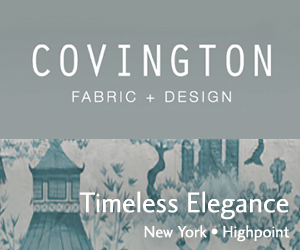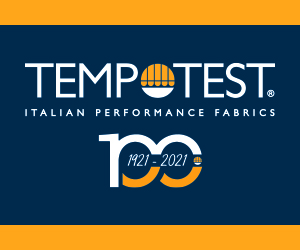Quaker Boosts 2000 Sales 20% Through Export, Chenille Design
April 10, 2001
FALL RIVER, Mass. – Quaker president Larry Liebenow, credits successful applications of chenille yarns and a dedication to export for a 20.5% sales gain with a total of $303 million in sales, for the 2000 fiscal year, a record for the company.
''Our growth since May has been through increased market share as opposed to overall growth in the American market," he said. The increase – more characteristic of high-tech companies in their heyday than textile companies – is remarkable considering that it's happened in the vortex of slowing U.S. retail furniture sales since May 2000, said Liebenow. Now producing a million yards of upholstery fabric a week, Quaker has boosted its per-yard sales average by $2.30 over the last five years. Its Whitaker line is the top-end with a price range of $6.50 to $45 for camel hair.
"While we have graded up the line, we have never left where we started from – under $4," said vice president of sales Tom Muzekari. The growth in Quaker's business has come in the $5-$10 a yard category, he said. "At the same time, we haven't given up the market at under $5. The overall upholstery market has grown 'worldwide even though it is mature."
Meanwhile, Quaker expects to introduce a lower priced line under a new name, Davol, sometime this year.
Quaker also established a stock delivery program - from its mill - for the European market in the last quarter of 2000. "From Europe," Muzekari said, "we can ship to the Middle East and Africa. Right now, we're able to deliver to Europe within a week of the order, directly from Fall River." He said that Quaker hopes to base this program in a European warehouse along the lines of its Brazilian stock and delivery system set up one year ago.
"The upholstery market has increased," said Muzekari. "We're set up to roll now. One gets increases in market share during weak markets. We now have showrooms in Mexico City, Guadalajara and Sao Paulo, the U.K., Dubai and Poland, with warehouses in Mexico City and Brazil.
Muzekari said that Quaker's design department, which is directed by Beatrice Spires, is also adapting its designs for export. ''We're designing more of our line with an international look and color palette. We also tailor each product for the specific country and customer. We have one designer, Lloyd Felix, dedicated to specials requested by the customer.'' Addy Boice handles international designs.
Wholesalers represent another market, which Quaker has targeted for the first time. Muzekari said this effort has been fruitful, especially as it applies to U.K. wholesalers. Quaker made a conscious decision to guarantee continuity of pattern and offer exclusivity of design.
''Perhaps it gets lost that a company the size of Quaker pays attention to export," said Liebenow. "Export sales are 15% of our business overall, and we expect a doubling of export sales over the next five years. We support the idea of free trade areas in the Americas that will develop a NAFTA agreement from Canada to Argentina to Chile and in between. This is President Bush's number one trade priority."
But while Quaker has begun to reach more into international markets, it has found that like other companies with similar ambitions, it's vulnerable to copying.
"We saw our designs being woven on looms in China with books of Quaker's fabric samples on the premises for use in making the copies," Muzekari said. We see Chinese copies of our fabrics in Saudi Arabia and Russia. One of the problems customers may have in buying copies is not being able to get enough quantity if the design reorders well. If we all knew what would sell, we wouldn't have to work so hard."
In addition to growing its export, Liebenow announced that Quaker will begin to create its own artwork in a new design studio scheduled for construction at the Fall River mill. "Up until now, we have purchased all of the original art used in our designs from the outside world," Liebenow said. ''We will continue to purchase most of our artwork from outside sources, having an internal capability that allows us to fully integrate the whole design process. This will give our design people access to the original merchandising plan so that we can tailor design to the needs of specific customers.''
Quaker produces more than 1,000 designs during two markets per year. Its production is buttressed by its yarn division, Nortex, a chenille and novelty yarn manufacturer. Nortex makes yarn of linen, silk, wool, camel hair and synthetics. Quaker was the only American yarn manufacturer given a berth in the Pitti Filati yarn exhibition in Florence, Italy.
Quaker has been in the chenille yarn business for 25 years through Nortex. "We have developed so many new tools to affect the end product's feel and look. It has even replaced velvet in the market because the consumer wants the soft touch, comfort and design offered by our chenille based fabrics," said Liebenow. +++6 Quaker uses 54-inch width looms but it is considering plans to do wide-width, if only to better service the bedding industry, he said.
''Our growth since May has been through increased market share as opposed to overall growth in the American market," he said. The increase – more characteristic of high-tech companies in their heyday than textile companies – is remarkable considering that it's happened in the vortex of slowing U.S. retail furniture sales since May 2000, said Liebenow. Now producing a million yards of upholstery fabric a week, Quaker has boosted its per-yard sales average by $2.30 over the last five years. Its Whitaker line is the top-end with a price range of $6.50 to $45 for camel hair.
"While we have graded up the line, we have never left where we started from – under $4," said vice president of sales Tom Muzekari. The growth in Quaker's business has come in the $5-$10 a yard category, he said. "At the same time, we haven't given up the market at under $5. The overall upholstery market has grown 'worldwide even though it is mature."
Meanwhile, Quaker expects to introduce a lower priced line under a new name, Davol, sometime this year.
Quaker also established a stock delivery program - from its mill - for the European market in the last quarter of 2000. "From Europe," Muzekari said, "we can ship to the Middle East and Africa. Right now, we're able to deliver to Europe within a week of the order, directly from Fall River." He said that Quaker hopes to base this program in a European warehouse along the lines of its Brazilian stock and delivery system set up one year ago.
"The upholstery market has increased," said Muzekari. "We're set up to roll now. One gets increases in market share during weak markets. We now have showrooms in Mexico City, Guadalajara and Sao Paulo, the U.K., Dubai and Poland, with warehouses in Mexico City and Brazil.
Muzekari said that Quaker's design department, which is directed by Beatrice Spires, is also adapting its designs for export. ''We're designing more of our line with an international look and color palette. We also tailor each product for the specific country and customer. We have one designer, Lloyd Felix, dedicated to specials requested by the customer.'' Addy Boice handles international designs.
Wholesalers represent another market, which Quaker has targeted for the first time. Muzekari said this effort has been fruitful, especially as it applies to U.K. wholesalers. Quaker made a conscious decision to guarantee continuity of pattern and offer exclusivity of design.
''Perhaps it gets lost that a company the size of Quaker pays attention to export," said Liebenow. "Export sales are 15% of our business overall, and we expect a doubling of export sales over the next five years. We support the idea of free trade areas in the Americas that will develop a NAFTA agreement from Canada to Argentina to Chile and in between. This is President Bush's number one trade priority."
But while Quaker has begun to reach more into international markets, it has found that like other companies with similar ambitions, it's vulnerable to copying.
"We saw our designs being woven on looms in China with books of Quaker's fabric samples on the premises for use in making the copies," Muzekari said. We see Chinese copies of our fabrics in Saudi Arabia and Russia. One of the problems customers may have in buying copies is not being able to get enough quantity if the design reorders well. If we all knew what would sell, we wouldn't have to work so hard."
In addition to growing its export, Liebenow announced that Quaker will begin to create its own artwork in a new design studio scheduled for construction at the Fall River mill. "Up until now, we have purchased all of the original art used in our designs from the outside world," Liebenow said. ''We will continue to purchase most of our artwork from outside sources, having an internal capability that allows us to fully integrate the whole design process. This will give our design people access to the original merchandising plan so that we can tailor design to the needs of specific customers.''
Quaker produces more than 1,000 designs during two markets per year. Its production is buttressed by its yarn division, Nortex, a chenille and novelty yarn manufacturer. Nortex makes yarn of linen, silk, wool, camel hair and synthetics. Quaker was the only American yarn manufacturer given a berth in the Pitti Filati yarn exhibition in Florence, Italy.
Quaker has been in the chenille yarn business for 25 years through Nortex. "We have developed so many new tools to affect the end product's feel and look. It has even replaced velvet in the market because the consumer wants the soft touch, comfort and design offered by our chenille based fabrics," said Liebenow. +++6 Quaker uses 54-inch width looms but it is considering plans to do wide-width, if only to better service the bedding industry, he said.
















